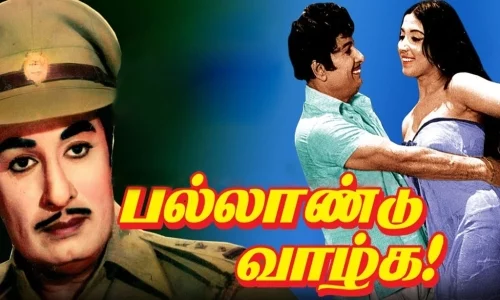
Pallandu Vaazhga (Eng: Long live!) is a 1975 Indian Tamil-language drama film directed and edited by K. Shankar. A remake of the 1957 Hindi film Do Aankhen Barah Haath, it stars M. G. Ramachandran and Latha. Pallandu Vaazhga revolves around a prison warden (Ramachandran) who takes six paroled convicts (M. N. Nambiar, V. K. Ramasamy, Thengai Srinivasan, R. S. Manohar, P. S. Veerappa and Gundumani) to work on a dilapidated country farm in an attempt to rehabilitate them.
Rajan is a prison warden. He takes six paroled convicts – Bhaiyaravan (who stabbed a businessman), Mayandi (an ex-barber who knifed a customer), Mounkannu (who stabbed a man and his daughter), Sangili (who drowned his wife), David (who killed a policeman) and Kalayr (who killed his family) – and makes them work hard with him on a dilapidated country farm, with the intention of rehabilitating them through hard work and kindly guidance. He is, however, given an ultimatum: he will be arrested if even one of the convicts attempts to escape.
The group comes across Saroja, an itinerant seller who they get attracted to, but she only gets close to Rajan, after he saves her from a bunch of goons. As Saroja is homeless, the six convicts plead with Rajan to let the girl stay with them and he subsequently agrees. When Sangili coincidentally runs into his long-lost family, he tearfully reunites with them. But they appear homeless, so Rajan allows them also to stay with him and the other convicts. This angers the other convicts who feel that Rajan did not give them freedom, compelling them to try killing him to escape.
Mayandi agrees to give Rajan a shave, plotting to cut his neck, and Rajan remains unaware of the threat to his life. Mayandi sees Rajan’s magical eyes and gets hypnotised, forcing him to abort the idea of murder. The convicts who were attempting escape during this time see a statue of C. N. Annadurai and because they see Rajan’s spirit in it, they get hypnotised and return. The escape attempt is seen by the other policemen around, leading to Rajan’s stay in jail for one day. However, when they hear that the convicts have returned, Rajan is released and returns to duty. The convicts gradually turn into good people and become attached to Rajan, who dreams of marrying Saroja, in his mother’s presence.
One night, the convicts are invited to a bar by a corrupt businessman and Rajan is unaware of this. They return drunk and almost attack Rajan and Saroja. Rajan is not pleased with their status and commands them to kill him if that is what they want. Hypnotism and conscience again strike the convicts, causing them to drop their weapons. The next morning, the convicts fall at Rajan’s feet and explain that the corrupt businessman forced them to drink; they earn the forgiveness of both Rajan and Saroja.
Later, the corrupt businessman orders that Rajan and his convicts surrender, or else their plantation and home will be destroyed. Rajan refuses, so the businessman sends his thugs and elephants to destroy everything in sight. However, Rajan and his men vigorously battle all the thugs and emerge victorious, while the local police capture the corrupt businessman and arrest him. Rajan, having been praised for transforming the six convicts into reformed people, frees them and tearfully sees them off.
Directed by K. Shankar
Produced by S. Maniyan & Vidwan V. Lakshmanan
Screenplay by S. Maniyan, Vidwan V. Lakshmanan, Thamarai Manalan & Na. Pandurangan
Story by V. Shantaram
Starring M. G. Ramachandran, Latha
Music by K. V. Mahadevan
Cinematography T. V. Rajaram
Edited by K. Shankar
Production Udhayam Productions
Release date 31 October 1975
Running time 154 minutes
Country India
Language Tamil

